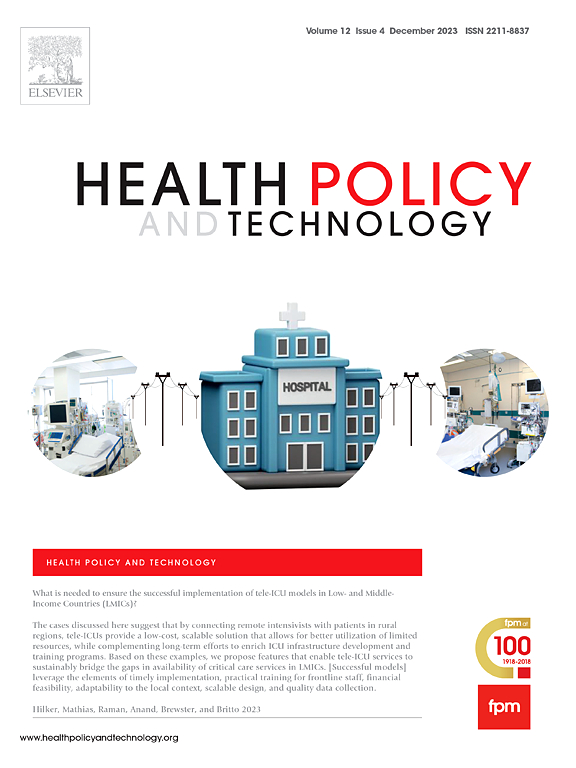Implementing a clinical decision support system in an Aboriginal health service – A qualitative case study
IF 3.4
3区 医学
Q1 HEALTH POLICY & SERVICES
引用次数: 0
Abstract
Objective
This qualitative case study aims to evaluate the implementation of a clinical decision support system (CDSS) – Territory Kidney Care (TKC) – at an Aboriginal health service in the Northern Territory (NT) of Australia. This research aims to contribute understandings about the challenges clinicians face when navigating electronic systems within an Aboriginal health service setting and enablers and barriers to the implementation of CDSS.
Methods
Within a larger evaluation of TKC, this qualitative case study involved 13 baseline semi-structured interviews completed between October 2022 and January 2023 and seven follow up interviews conducted in June 2023. Through purposive sampling, clinicians in a range of primary care roles participated in the study. Interview transcripts were inductively and iteratively coded by two researchers using a thematic analysis approach.
Results
The baseline evaluation found that clinicians working in an Aboriginal health service used multiple electronic health systems, spent considerable time collating patient data across systems and faced challenges related to missing information, technological issues and limited training. The process evaluation of TKC implementation identified that adequate training, a funded Implementation Officer role and supportive leadership were central enablers, while competing clinical priorities, time limitations, staff shortages, access processes were key barriers to uptake and usage.
Conclusions
This case study highlights the need for integrated data tools in Aboriginal health services to bridge the gaps between primary, tertiary, government and non-government services. The evaluation emphasises the importance of embedding CDSS within workflows and ensuring there are dedicated staff and resources to facilitate implementation.
Lay Summary
This study focuses on how a clinical decision support system was implemented in an Aboriginal health service in the Northern Territory of Australia. Through interviews with clinicians, we identify key barriers and enablers to accessing clinical decision support, as an adjunct to electronic health records. Clinicians in Aboriginal health services must use multiple systems and spend a lot of time looking for information about their patients; a new integrated data platform called Territory Kidney Care was implemented to pull information together from different health services. This research highlights the importance of ensuring there are dedicated staff and resources to help implement new systems.
在原住民健康服务中实施临床决策支持系统-定性案例研究
目标本定性案例研究旨在评估澳大利亚北部地区(NT)土著医疗服务机构临床决策支持系统(CDSS)--"地区肾脏护理"(TKC)的实施情况。这项研究旨在帮助人们了解临床医生在土著医疗服务环境中使用电子系统时所面临的挑战,以及实施 CDSS 的有利因素和障碍。方法在对 TKC 进行更大规模评估的过程中,这项定性案例研究在 2022 年 10 月至 2023 年 1 月期间完成了 13 次基线半结构式访谈,并在 2023 年 6 月进行了 7 次后续访谈。通过有目的的抽样,参与研究的临床医生来自不同的基层医疗机构。基线评估发现,在原住民医疗服务机构工作的临床医生使用多个电子医疗系统,花费大量时间整理各系统中的患者数据,并面临信息缺失、技术问题和培训有限等挑战。对 TKC 实施过程的评估发现,充分的培训、有资金支持的实施官员角色和支持性领导是主要的推动因素,而相互竞争的临床优先事项、时间限制、人员短缺和访问流程则是吸收和使用 TKC 的主要障碍。评估强调了将 CDSS 嵌入工作流程并确保有专门的人员和资源来促进实施的重要性。通过对临床医生的访谈,我们发现了临床决策支持作为电子健康记录辅助工具的主要障碍和促进因素。原住民医疗服务机构的临床医生必须使用多个系统,并花费大量时间寻找有关病人的信息;一个名为 "领地肾脏护理"(Territory Kidney Care)的新集成数据平台已经投入使用,以便将不同医疗服务机构的信息整合在一起。这项研究强调了确保有专门的人员和资源来帮助实施新系统的重要性。
本文章由计算机程序翻译,如有差异,请以英文原文为准。
求助全文
约1分钟内获得全文
求助全文
来源期刊

Health Policy and Technology
Medicine-Health Policy
CiteScore
9.20
自引率
3.30%
发文量
78
审稿时长
88 days
期刊介绍:
Health Policy and Technology (HPT), is the official journal of the Fellowship of Postgraduate Medicine (FPM), a cross-disciplinary journal, which focuses on past, present and future health policy and the role of technology in clinical and non-clinical national and international health environments.
HPT provides a further excellent way for the FPM to continue to make important national and international contributions to development of policy and practice within medicine and related disciplines. The aim of HPT is to publish relevant, timely and accessible articles and commentaries to support policy-makers, health professionals, health technology providers, patient groups and academia interested in health policy and technology.
Topics covered by HPT will include:
- Health technology, including drug discovery, diagnostics, medicines, devices, therapeutic delivery and eHealth systems
- Cross-national comparisons on health policy using evidence-based approaches
- National studies on health policy to determine the outcomes of technology-driven initiatives
- Cross-border eHealth including health tourism
- The digital divide in mobility, access and affordability of healthcare
- Health technology assessment (HTA) methods and tools for evaluating the effectiveness of clinical and non-clinical health technologies
- Health and eHealth indicators and benchmarks (measure/metrics) for understanding the adoption and diffusion of health technologies
- Health and eHealth models and frameworks to support policy-makers and other stakeholders in decision-making
- Stakeholder engagement with health technologies (clinical and patient/citizen buy-in)
- Regulation and health economics
 求助内容:
求助内容: 应助结果提醒方式:
应助结果提醒方式:


